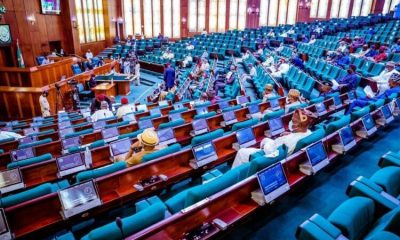Nigeria News
CBN Clarifies Voluntary Exit Of 1,000 Staff, Dismisses Claims Of Forced Resignation

The Central Bank of Nigeria (CBN) has reiterated that the 1,000 employees disengaged in December 2024 voluntarily opted for the Early Exit Programme and were not compelled to leave.
CBN Governor Olayemi Cardoso addressed this matter during an investigative hearing held by the House of Representatives’ ad-hoc committee, which is examining the circumstances surrounding the staff exits and the allocation of a ₦50 billion severance package.
Represented by Bala Bello, Deputy Director of Corporate Services, Cardoso explained that the programme was entirely optional and designed to ensure optimal organisational performance.
“The Early Exit Programme, Restructuring and Re-organisation are basically ways and means through which the performance of an organisation is optimised by ensuring that round pegs are put in right holes. The manpower requirement of the bank is actually met.
“The man loading, which is the key responsibilities, key performance indicators of the bank, vis-a-vis the number of people driving the performance of that bank, is at a level where it’s optimum, balancing the human resource requirement, the capital requirement, the skill requirement, as well as the IT requirement of the bank.
“You are very much aware that the entire world is going through a process of digitising its operations. And then once that is done, a lot of opportunities are created, just like a lot of redundancies are also equally created.
“And you have had instances in which, in the past, the request for staff to actually exit the bank voluntarily actually emanated on the part of the staff. And I believe the Central Bank is not necessarily the first organisation to have done that.
“I’m very happy to mention that the early exit program of the CBN is 100 per cent voluntary. It’s not mandatory. Nobody has been asked to leave, and nobody has been forced to leave. It’s a completely voluntary programme that has been put in place,” he explained.
Bello added that such initiatives are part of broader restructuring and reorganisation efforts aimed at aligning manpower needs with the bank’s operational goals, ensuring that resources and skills are effectively balanced.
He explained, “I believe several organisations across the world, and even within this country, both in terms of the private sector and the public sector, are undertaking similar exercises.”
Bello further highlighted that such voluntary exit programmes are not unique to the CBN, noting that both public and private sector organisations regularly undertake similar exercises.
He addressed concerns about career stagnation, explaining that the programme helps alleviate situations where career advancement becomes impossible due to limited vacancies.
“In the past, we had instances in which cases of stagnation and lack of career progression appear. I mean, in an organisation, you’ve got a pyramid where from each level to the next level, the gap keeps narrowing. If not, you are going to have a quasi-organisation, an inverted pyramid.
“It doesn’t work. It gets to the level where you have, for example, 30 departments in the Central Bank. You cannot have 60 directors, manning 30 departments. It’s not going to work.
“Once those vacancies are filled, it gets to a level where some people, even though they are very qualified, able and willing, but the vacancies are not there. And then they got to a level where they are stagnated for a period of time,” he said.
The Chairman of the Ad-hoc Committee, Bello Kumo, sought clarification on the objectives of the programme, its timeline, and its alignment with the CBN’s restructuring and reorganisation efforts.
In response, Bello reiterated that the initiative aims to address redundancies, enhance efficiency, and prevent stagnation in career progression within the bank.
The hearing provided an opportunity for the CBN to affirm its commitment to transparency while addressing public concerns over the severance package and the rationale behind the disengagement process.
“Let me start by saying that the House of Representatives, the 10th National Assembly, understand that CBN is implementing the Restructuring, Reorganising and the Early Exit Program. I don’t know whether the CBN Governor can explain or brief this committee on the objectives of the Restructuring, Reorganising and Early Exit Programme to this committee.
“Can you explain the Early Exit Program and what you intend to achieve with it? When it starts, when it will end, and what is the connection?” he asked.












